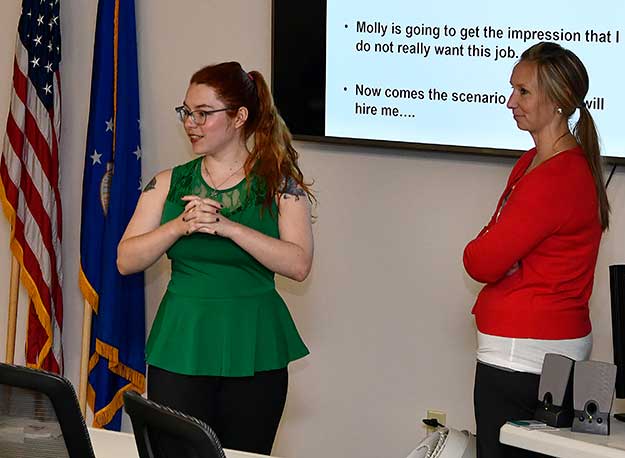Photo: Madison Muskopf, left, an Air Force civilian, discusses the topic of professionalism in the workplace during an Autism at Work program luncheon July 26 at Wright-Patterson Air Force Base, Ohio, while Molly Fore, program lead, looks on.
A one-of-a-kind Air Force Materiel Command employment initiative has entered its second successful year, bringing job opportunities and growth for a unique set of college graduates who might otherwise face challenges when looking for work in today's competitive job market.
The Autism at Work program, a collaboration between AFMC and Wright State University, Ohio, offers students and recent graduates with a diagnosis on the autism spectrum the opportunity to participate in paid, one-year internships across the Wright-Patterson Air Force Base footprint. The program provides the interns not only real-world job experience as Air Force civilians, but it also offers them the opportunity to learn and practice soft skills such as business etiquette and communication under a team of mentors dedicated to helping them achieve success in the internship and beyond.
 "This is a unique opportunity for individuals with autism to gain that critical career experience they may not have the chance to obtain in a traditional work environment," said Molly Fore, AFMC Autism at Work program lead. "These students are smart and have degrees in areas such as science, engineering, computer technology, math and a number of other areas that are highly relevant to our mission needs. We help break down barriers to employment and work with them as they progress from interview, to job offer, placement and beyond, helping them to achieve success."
"This is a unique opportunity for individuals with autism to gain that critical career experience they may not have the chance to obtain in a traditional work environment," said Molly Fore, AFMC Autism at Work program lead. "These students are smart and have degrees in areas such as science, engineering, computer technology, math and a number of other areas that are highly relevant to our mission needs. We help break down barriers to employment and work with them as they progress from interview, to job offer, placement and beyond, helping them to achieve success."
Nearly 20 interns are at Wright-Patterson AFB this year, working in positions ranging from mechanical engineering to computer software development, database migration, computer support and biomedical engineering. The interns work closely with supervisors and mentors trained to recognize and understand the unique challenges of working with the individuals and to help ensure an environment conducive to success.
"I believe that everyone, with and without a disability, needs a chance to show what they are capable of doing and should not be judged or labeled," said Sharon Stauffer, human resources management analyst and mentor.
Stauffer is mentoring one student at the Air Force Life Cycle Management Center.
"It is important that the employee knows himself better than I know myself. He was able to identify what tendencies and characteristics that he didn't like people doing around him and voiced them to me so that I could avoid them," Stauffer said.
A major challenge that many of the interns face stems from difficulty with social cues that may prevent them from being successful during the interview process. They may not be comfortable shaking someone's hand or with making eye contact, which may influence an interviewer's perception of their ability to meet the requirements of a job.
Fore, along with the Wright State University Office of Disability Services, works closely with both job candidates and potential mentors to mitigate these interview challenges.
"Hiring managers who express interest in a candidate are coached on some of the characteristics that someone on the autism spectrum might display during an interview. This awareness helps them to better focus on a candidate's responses to questions, versus the traits that may act as a distraction," Fore said.
In addition to offering access to a unique pool of talent, the Autism at Work program also helps to increase diversity in the workplace while helping to grow the workforce for the future.
"People typically shy away from things they don't understand or things that are outside of their comfort zone. From my experience, hiring people with autism is a great benefit for the government. As with any new hire, the person's job skills would need to be matched to the right job for the hiring to be successful. The employee that I worked with was very detailed oriented, efficient and dependable," Stauffer said.
The Autism at Work program is funded through the Workforce Recruitment Program, an internship initiative co-sponsored by the U.S. Department of Labor and the Department of Defense. The program offers candidates with disabilities an opportunity to work in offices within the DoD at no cost to the organization. Established in 1995, the WRP maintains a searchable database for managers and human resources specialists to source candidates nationwide by degree discipline, location preference and clearance level, among other qualifications. Current college students and recent graduates within six years of degree achievement are eligible for the funding.





Read Comments